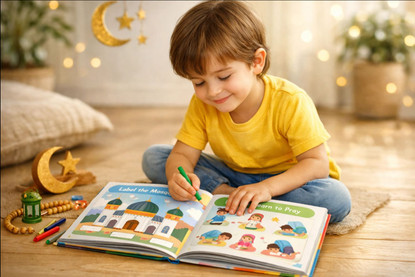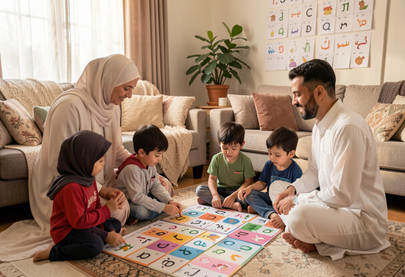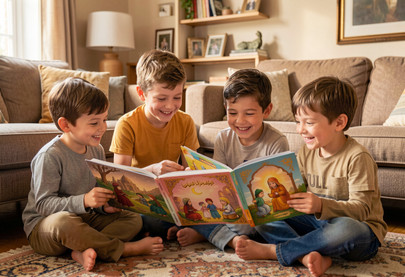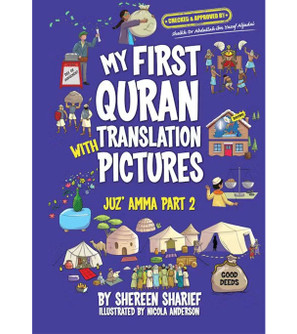Fun Arabic learning activities
Arabic learning activities
Kids get bored easily, so it’s essential to teach them through fun Arabic learning activities, and games. Learning through games and activities isn’t just fun, it enhances their skills and their cognitive and social abilities. We know that teaching Arabic to your kid on your own is not easy, therefore, we collected some of the best Arabic learning activities and games to engage them and have fun. Also, don’t forget to keep the child's age in mind when choosing activities and games. Additionally, don’t forget that every child has his own preferences and interests. You know them better than anyone else and can choose and adjust any activity to suit your learning journey with your child.
What are fun ways to teach Arabic?
There are many ways to teach Arabic to kids but the best way is always through games, activities, kids Islamic stories, and kids' stories. Here are some learning Arabic activities to play with your kid.
- Playdough.
Playdough is one of the best activities for kindergarten kids. Let your child shape the playdough into Arabic letters, or try to right their name in Arabic. It’s a fun game that builds creativity and enhances a child’s muscles.
- Arabic alphabet flashcards.
Play flashcards with your child, you can match letters with animal names, guess an animal name that starts with the Arabic letter, or play a word game. You can also use it to teach them about different topics like colors, and animals, memorize new words, and more. It’s a really fun and interesting activity to play with your kid.
- Coloring and writing activity.
Kids love to color and draw, you can download and print a coloring Arabic letters worksheet or writing letters worksheet and let your child color the letters or practice writing them. As the child keeps coloring or writing the same letter, he will memorize it easily.
- Visual aids like Arabic Alphabet posters.
Kids learn through colored images and pictures, so you can take advantage of that and make an Arabic Alphabet poster filled with colors and hang it on the wall. Try asking your child questions about the Arabic language like, how many letters in Arabic alphabet? And see his answer.
- Listen to Arabic alphabet songs.
Kids love listening to songs and they learn a lot from them, to make your kid learn Arabic easy way make them listen to Arabic kids' songs to learn Arabic easier.
- Arabic alphabet puzzles.
Another fun Arabic learning activity is puzzles, play Arabic alphabet puzzles with your kid to teach them the Arabic letters easily.
- Arabic alphabet snap game.
This is a great game to teach your child how the Arabic letters change their shape based on their place in the word.
- Arabic Word hunting.
Hide an Arabic word, let’s say an animal name for example, and ask your child to search for it. This’s a fun game that your child will enjoy playing.
How to teach Arabic to foreigners kids?
Kids in general learn through fun activities and stories, whether foreigners or not therefore we collected some of the best activities to teach them Arabic easily.
How to teach Arabic to kids?
Some of the best ways to teach Arabic to your kids in a fun way is through the following activities and games.
- Arabic Coloring Pages.
Kids enjoy coloring pictures more than you can imagine, give them an Arabic alphabet coloring book and let them color as they like.
- Calligraphy.
Write an Arabic sentence and ask your kids to write it in the best way and make a competition between them. Give a prize to the one who writes the sentence correctly in a beautiful way.
- Arabic Letter Matching Game.
This a great game to teach your kid Arabic letters. The game consists of the 28 Arabic alphabet and 28 matching cards. The game will help your kid memorize the letters and enhance their problem-solving skills.
- Arabic letters games quiz.
This’s a fun game to play with your little kid, ask the child to find the letter “ب” for example and let him search for it.
- Cartoon Arabic stories videos.
Kids love watching cartoons and they learn a lot from them, so make them watch Arabic stories for kids.
What is the most efficient way to learn Arabic?
The most efficient way to learn Arabic is through games and activities, they ae fun, interesting, and engaging and enhances the child's skills.
The best games to learn Arabic
Here are some of the best Arabic learning activities and games to play with your child: Arabic Matching Game Arabic Matching Game is an easy, fun, and fast-paced game for two or more players. It is a great way to learn the Arabic alphabet and pictures while developing concentration, matching, object, and alphabet recognition skills. All you have to do is to find as many matching tiles as you can. Once all the beautifully illustrated tiles are matched up, the player with the most tiles wins! Arabic Memory Game Arabic Memory Game is an easy, fun, and fast-paced game for two or more players. It is a great way to learn the Arabic alphabet and pictures while developing concentration, matching, object, and alphabet recognition skills. All you have to do is to find as many matching tiles as you can. Once all the beautifully illustrated tiles are matched up, the player with the most tiles wins! Darajat -Level 1 Contains 35 cards of different topics including Science, Short Stories, Poetry, Traditions and Nations, Tourism Sights, and How to do. The cards at this level are exclusively focused on teaching interrogative words, and understanding the question and answer accurately. The front of each card contains pictures and drawing with questions on the back. The questions are simple and short, between 2 and 4 words. The reader should know the Arabic alphabet and be able to read simple, short words. Darajat -Level 2 Contains 35 cards of different topics including Science, Short Stories, Poetry, Traditions and Nations, Tourism Sights, and How to do. Words on each card vary between 5 to 9 words The front of each card contains the text with the questions on the back of the card. The reader should be able to read short sentences and answer simple questions. Darajat -Level 3 For kids from 5 to 10 years. Contains 35 cards on different topics including Science, Short Stories, Poetry, Traditions and Nations, Tourism Sights, and How to do it. Words on each card vary between 10 to 16 words The front of each card contains the text with the questions on the back of the card. The reader should be able to read and understand a short text in Arabic and answer questions on the text. Darajat -Level 4 Contains 35 cards of different topics including Science, Short Stories, Poetry, Traditions and Nations, Tourism Sights, and How to do. At this level, cards gradually contain less punctuation (tashkeel). Words on each card vary between 17 to 24 words The front of each card contains the text with the questions on the back of the card. The reader should be able to read and understand a short text in Arabic and answer questions about the text. Darajat -Level 5 Contains 35 cards of different topics including Science, Short Stories, Poetry, Traditions and Nations, Tourism Sights, and How to do. Words on each card vary between 25 to 45 words The front of each card contains the text with the questions on the back of the card. The reader should be able to read and understand a short text in Arabic and answer questions on the text. Darajat -Level 6 Contains 35 cards on different topics including Science, Short Stories, Poetry, Traditions and Nations, Tourism Sights, and How to do. Words on each card vary between 46 to 59 words The front of each card contains the text with the questions on the back of the card. The reader should be able to read with little punctuation (tashkeel). Darajat -Level 7 Contains 35 cards on different topics including Science, Short Stories, Poetry, Traditions and Nations, Tourism Sights, and How to do it. Words on each card vary between 60 to 70 words The front of each card contains the text with the questions on the back of the card. The reader should be able to read with little punctuation (tashkeel). Hadith Challenge Game The Hadith Challenge Game is a unique game based on the sayings of the Prophet Muhammad. The idea behind this game is to provide the children with both fun and education. All questions are based on the authentic sayings of the Prophet Muhammad. They have been creatively worked into this game and children will enjoy answering them. This game can be played at school or at home with all the family members. Begin your journey and find out what fun it is to learn from the Hadith. Hajj Fun Game The Hajj Fun Game offers you entertainment and fun and at the same time makes it easy for you to learn the meaning and message of the hajj and to acquire knowledge of the important historical places associated with it. It will enable you to learn how the acts and rites are performed during hajj and what their dos and don’ts are. In short, the Hajj Fun Game will bring alive the annual pilgrimage of Hajj. Munafisah – Quran Challenge Game The Quran Challenge Game for children is a unique game based on the Holy Quran. The idea behind this game is to provide the children with both fun and education. All questions are taken from the Quran. They have been creatively worked into this game and children will enjoy answering them. This game can be played at school or at home with all the family members. Begin your journey and find out what fun it is to learn from the Quran. My First 50 Arabic Words The first 50 words contain 50 large flashcards using the 50 most frequently used words to help your child develop the basic Arabic vocabulary. On one side of the card there is one beautifully illustrated picture and on another side of the card is its word in Arabic-English and its transliteration to help you easily read and pronounce the word. My First Arabic Game There are 10 ways to play and learn the Arabic alphabet. Includes wipe-and-clean pen. Quran Explorer Game The Quran Explorer Game is a game based on the Quran. It is suitable for 2 to 6 players aged eight and above. It is a highly entertaining knowledge game to play with family and friends. Quran Knowledge Game The Quran Knowledge Game is a game based on the Quran. It is suitable for 2 to 6 players? aged eight and above. It is a highly entertaining knowledge game to play with family and friends. In this simple and fast-paced game of clues, you have to guess the correct answers to clues, earn points, move on the game board, and then race to the finish before your friends reach there. Along the way, as you earn points, you also learn a lot about the Quran and its teachings. This game is truly a journey into the world of fun, wisdom, and education for an entire family. Contents: 1 Game Board, 99 Quran Knowledge Cards, 22 Quran Cards, 6 Playing Pieces, 1 Dice, 1 Instruction Manual. Salat Knowledge Game The Salat Knowledge Game is suitable for 2 to 4 players aged three and above. In this game of slides and ladders, you spin the wheel and race to the finish before your friend reaches there. Along the way you learn the meaning and message of salat, that is, the five daily prayers. If you miss a prayer, you go down the slippery slide, but if you offer it on time and with care, you climb up the ladder. And that is not all. There are chances to win a Salat Card too. Answer the question given on the card correctly and increase your knowledge about the five daily prayers. In this way, you don’t just try to run for the finish line, but learn all about salat as well. Isn’t this a fun way to play and learn?
How to teach the Arabic language to beginners?
You can do that easily through fun Arabic learning games and activities, we mentioned many of the above, and here are some of the best activity books to help you out: Arabic Writing Workbook
- This attractive book is designed with students in mind. Includes:
- Plenty of exercise pages for year-long learning.
- Letters are placed on a grid of colored lines for a clear understanding of the patterns.
- Grids of dotted lines are provided for practice writing.
- Thin arrow-head lines explain how to begin and end writing each letter.
- Gradual progression from one-letter to two- and three-letter words.
- Helps recognition of letters as they change shape in a word.
- Essential tool for beginning learners – regardless of age.
Write And Express In order to develop linguistic and expressive skills in children, there needs to be a variety of exercises to engage the child and help nurture the required skills. Teaching reading, vocabulary, and grammar, as many curriculums do, is not enough to develop writing abilities, so additional exercises are needed to cultivate the skill of expressive writing in students. These books set out to do just that, using a large number of exercises to develop the skills of writing and composition in children at the primary levels. The books contain pictured exercises on writing and composition; children can sort words in sentences or write about picture stories, they can fill in the blanks with suitable words, or they can rearrange sentences to make paragraphs. Exercises are arranged in three stages over three different books, all with colorful images to attract children. This three-book series contains varied and progressive exercises to teach guided- and free-composition, as well as functional writing so students can communicate with others in their daily lives. Some of the writing exercises the series focused on:
- Arranging words to make sentences
- Arranging sentences to write a story
- Connecting clauses with matching images
- Filling in the blanks in a story or text
- Describing images and commenting on them
- Writing a story using images and helping words
- Filling in forms and applications with appropriate information
- Writing paragraphs and using punctuation marks
- Writing memos for personal correspondence
- Editing speeches
- Practicing congratulating messages for different occasions
- Writing diary entries
- Writing open compositions on various subjects and occasions
Fun with Arabic Alphabet Fun with Arabic Alphabet is an ideal first book for your child to learn and practice writing the Arabic alphabet. The pages are packed with beautiful, clear, and easily recognizable pictures that encourage the youngest children to learn Arabic in a fun way. Language Games At Our Children’s Hand Language games are one of the most important educational activities in the language classroom. Because the linguistic classroom is an artificial environment to teach the language, and the language game reduces this artificiality environment and also achieves a great deal of realism in language practice, which is an important complement to the educational process; Learning the language is heavy for adults before children, and playing in an atmosphere of pleasure and fun helps the success of education, as it develops the spirit of competition among students and their ability to work in groups. Benefits of language games:
- Move the language from the theoretical side to the practical side through the practical application of the language.
- Develop the student’s language skills; Especially the skills of reading and speaking, and it also enhances language elements such as vocabulary and structures.
- Facilitates education.
- It makes the lesson interesting because it is both useful and entertaining.
What would you do to make learning Arabic easier?
I think that the best way to teach Arabic in an easy way is to start simply and slowly, start by teaching kids the Arabic letters through games and songs. The fastest way for kids to memorize anything is through games, songs, and cartoons. You could play any of the activities we mentioned above to make learning Arabic easy and fun, like matching games, coloring books, and Arabic stories. When telling a story tell it in a dramatic way to make it more interesting to them, focus on the new words, and make the kid repeat it after you.
What to do on Arabic language Day?
on Arabic language Day you could make a presentation on the importance of the Arabic language, watch Arabic cartoons with the kids, make contests and play games with them, read Arabic stories or whatever you like, but don’t forget to add the dramatic effect. That’s it for today’s article, I hope you found it useful, if you have any questions or searching for books or children's games visit our website Madinah Media.
















